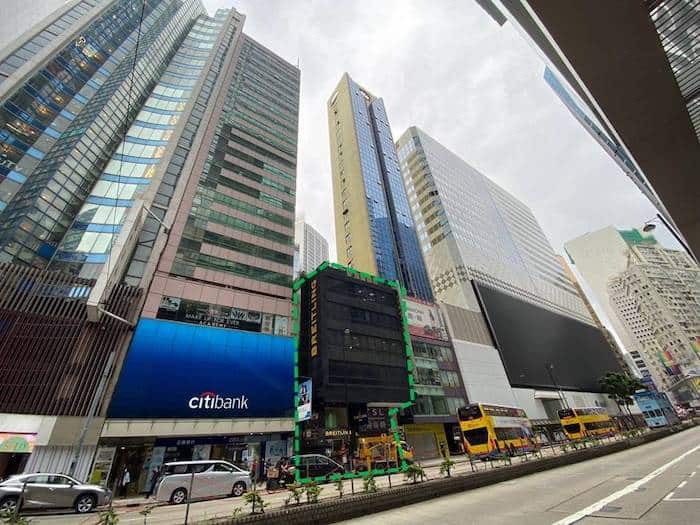
519-521 Hennessy Road in Causeway Bay has been listed for sale
The COVID-19 crisis has made real the unimaginable in many ways, and now Hong Kong is seeing a site on the world’s most expensive shopping strip being put on the market for the first time in a decade, Mingtiandi can reveal.
The owners of 519-521 Hennessy Road, which is part of a 250 metre-long luxury shopping corridor that stretches from East Point Road to Percival Street in the district three MTR stations east of Central, are asking HK$1 billion ($130 million) for the rights to develop a new commercial tower on the site that that could reach as high as 20 storeys, according to a source who spoke to Mingtiandi.
“Very few properties change hands on this strip of Hennessy Road due to its incredibly prestigious location,” said Reeves Yan, head of capital markets in Hong Kong for CBRE, which is the sole agent for the en-bloc sale.
The current six-storey retail building, which is one shop along from high-end department store Sogo and just opposite luxury mall Hysan Place, is being marketed by the property consultancy as an opportunity to redevelop the 999-year leasehold chunk of land.
Selling a Rare Prize in Causeway Bay
Occupying a site area of 2,000 square feet (186 square metres) zoned for commercial use, Yan expects 519-521 Hennessy Road to be redeveloped either as a Ginza-style retail building or a medical centre.
“This kind of trophy asset, in the best location in Causeway Bay, will receive a lot of interest from both domestic and international buyers,” Yan told Mingtiandi.
The sellers are the owners of Hong Kong musical instrument retailer Tom Lee Music together with the family office of the Philippines Pena clan, according to city records and market sources who spoke with Mingtiandi.

CBRE’s Reeves Yan said the property will draw interest from domestic and international investors
Based on the potential gross floor area of 30,000 square feet, the sellers are aiming to fetch HK$33,333 per square foot from the sale of the property on the Causeway Bay shopping strip, which is traditionally rated as one of the most expensive in the world.
A study published last September by Yan’s rivals at Cushman & Wakefield showed the high street shops in Causeway Bay attracted the highest average rents in the world — some $2,745 per square foot per year. Those rental rates were more than 18 percent higher than the next priciest shop location — Upper Fifth Avenue in Manhattan.
Maximizing Rental Value
A newly developed Ginza-style property on the site with retail and F&B offerings could generate monthly rent in the region of HK$4 million per month, according to an industry source who spoke to Mingtiandi.
A high-end medical centre, on the other hand – which might include specialist cosmetic and beauty treatments – could yield a higher rent of up to HK$5 million per month.
According to Yan, medical centres are particularly resilient from the current market downturn and have a high potential for rental growth.
The existing 10,000 square foot property, which is 50 metres from Causeway Bay MTR station, is currently occupied by Swiss luxury watchmaker Breitling and Hong Kong jeweller Tse Sui Luen.
Mingtiandi has learned that the leases of both tenants are due to expire by the end of this year, while the average rent in the building is understood to be HK$1.5 million per month.
Tom Lee Music, which currently owns the larger of the two shop units, acquired its portion of the property in 1992 for HK$40 million, while the undisclosed Philippine family office purchased the other shop unit and the upper floors in 1988 for HK$26.8 million.
Selling as the Retail Sector Faces a Crisis
The listing of the property on Hennessy Road comes as Hong Kong’s once red-hot retail sector is facing a crisis, following anti-government demonstrations 2019 and this year’s pandemic.
The latest official figures for the sector, which were released by the government on 31 March, revealed that sales fell in value by 44 percent during February to HK$22.7 billion, the largest drop on record.
The shopping apocalypse has caused cash crunch for tenants. A survey carried out by the Hong Kong Retail Management Association released on 16 April revealed that nine out of ten retailers had suffered a “medium to severe” loss as a result of the pandemic.
Around 40 percent of Hong Kong’s retailers have the resources to sustain their businesses for a further four more months, while 20 percent will run out of cash by the end of the year, according to the HKRMA survey.
Leave a Reply